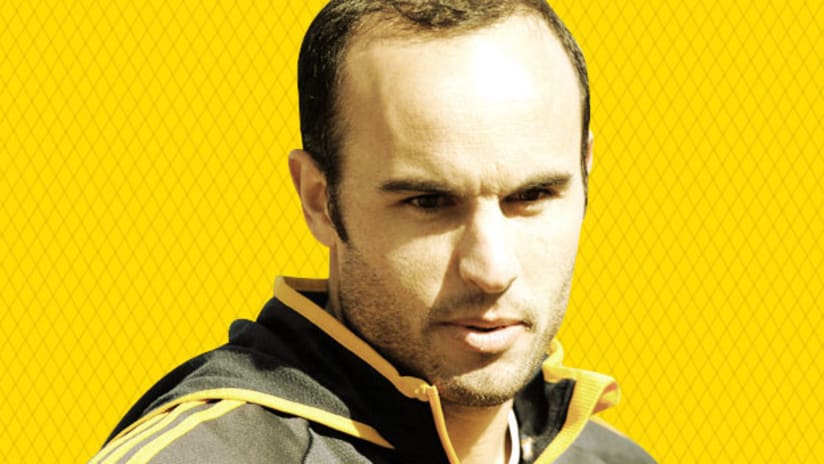In anticipation of opening weekend in Major League Soccer, MLSsoccer.com will profile five of the biggest names in the league heading into the 2014 season. Starting off our series is managing editor Jonah Freedman, who takes a look at the three-act play that is the career of LA Galaxy and US national team star Landon Donovan.
Now in his early 30s, the onetime teen sensation is facing his fourth and final World Cup this summerand is set to take over as the league's all-time leading scoreras early as the season opener on Saturday vs. Real Salt Lake (10:30 pm ET, MLS Live).
In many ways, Landon Donovan lives arguably the greatest moment in US soccer history just like the rest of us:
On YouTube.
If you’re a diehard soccer fan, you don’t need the set-up of what comes next. Even if you’re just a sports fan who tunes into the Beautiful Game every four years, you probably know it.
And if you’re neither, you may know the name Landon Donovan. And you might associate his name with something that happened back in late June of 2010 thousands of miles away in Pretoria, South Africa.
Time was running out on the US national team’s run at the last World Cup. After 90 minutes of somewhat drab soccer, the plucky Americans looked like they were out of miracles after a run in South Africa that included a heroic 1-1 draw with England and an improbable comeback from a two-goal deficit for a draw against Slovenia.
In their group-stage finale against Algeria, the math was quite simple: If they didn’t win, they were out. And it was all goose eggs by the end of regular time at Loftus Versfeld Stadium.
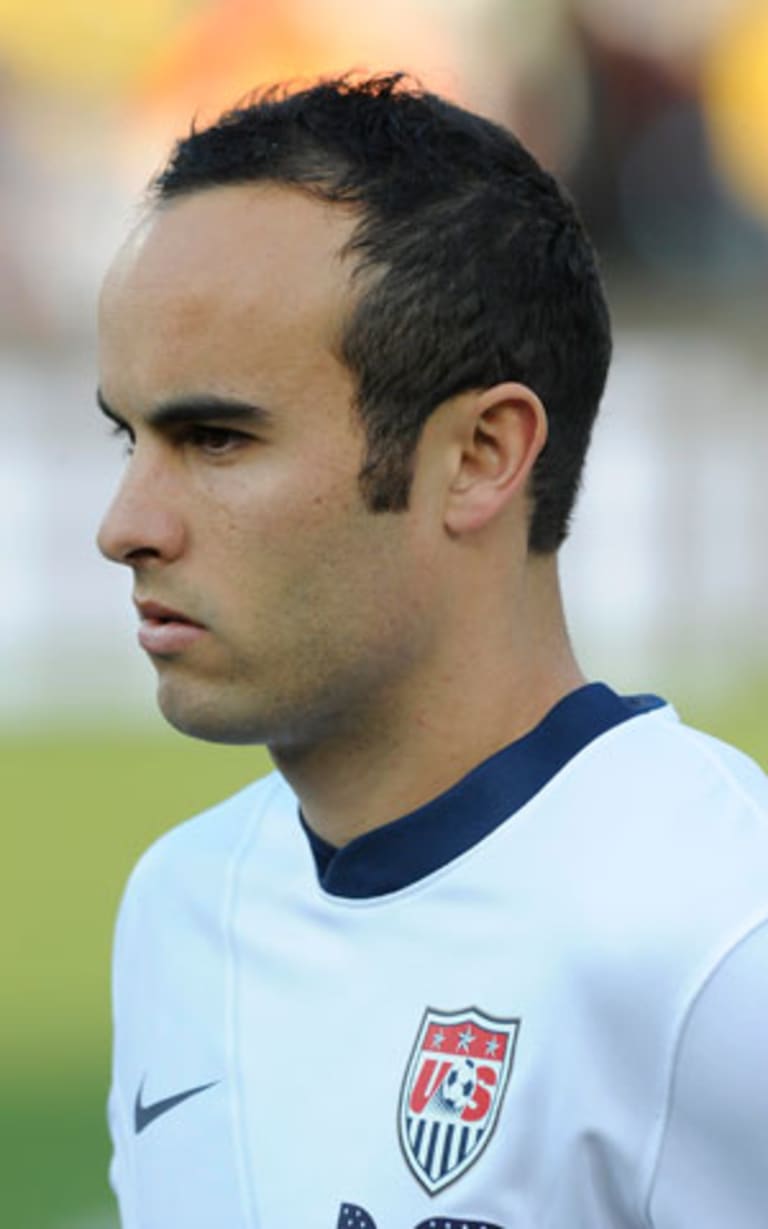
Landon Donovan is preparing for his fourth and final World Cup this summer, but he says the doesn't think about his legacy. Of his historic goal in 2010 against Algeria, he says: "It was my job and I was in the right spot and the right time.”
(USA Today Sports)
With one desperate surge upfield in the first minute of extra time, Donovan delivered the defining moment of the Americans’ run in South Africa, depositing the rebound from Clint Dempsey’s attempt into the back of the net and clinching victory, sending the American team into pandemonium near the sideline.
It was a flashbulb American sports moment that, in many ways, ranks up there with “The Miracle On Ice,” “The Catch” and Foreman’s knockout of Frazier.
“I get emotional when I see it,” Donovan admits to MLSsoccer.com four years later. “But it’s weird to be the person who helped create it.”
Donovan can afford to be humble. He turns 32 on Tuesday and is the owner of almost every single milestone there is to hold at the club and international level. He’s a guy who has literally seen almost all there is to see in professional soccer.
But the facts speak for themselves. Donovan’s Miracle in Pretoria was seen by 8.6 million TV viewers in the United States. It helped smash American viewership records for a World Cup and caused an unprecedented spike in interest in the US national team.
The goal was everywhere. It led off SportsCenter. It was the toast of late-night TV, from The Daily Show with Jon Stewart to The Tonight Show. And in the age of social media, it lives on in eternity: A compilation video of fans celebrating the moment in numerous sports bars across the country has nearly 4.5 million views on YouTube.
That includes Donovan, who still gets goose bumps when he watches it. But it’s a bizarre, detached kind of viewing.
“When you’re in it, you don’t see it with the same shine and the same excitement,” he says. “It’s just like, it was my job and I was in the right spot and the right time.”
*
Like a Shakespearean figure, Donovan’s career can be divided into a three-act play.
In Act I, we’re introduced to our hero, a heat-seeking star-in-the-making out of Ontario, Calif. By age 19, he scores twice in a World Cup and leads his club team to two MLS Cups, unprecedented feats for a player so young
In Act II, he achieves more: playing in two more World Cups, becoming the all-time leading goalscorer in US national team history and winning three more MLS Cups, two of which came next to David Beckham. But it’s conflict-riddled and full of obstacles: He experiences love and loss, and struggles under the weight of expectations and feeling the pressure to remain elite.
We are in the middle stages of the resolution, Act III. And the climax is unwritten.
Donovan is three months from his fourth and, he says, final World Cup. He is still the focal point of a very good LA Galaxy team, with a chance to win the CONCACAF Champions League and an unprecedented sixth MLS Cup. He’s also a single goal away from standing alone as the all-time leading goalscorer in MLS history.
And yet the Landon of today doesn’t speak about a burning desire for personal achievements. He’s not particularly interested in speculating on what mark he’ll leave on the American soccer landscape when it’s all said and done.
In fact, he’s unsure how much longer he’ll play at all, saying he plans to “reevaluate at the end of every year and see how I feel and how much longer I want to keep going.”
These are surely the days of Landon in Winter.
“I don’t ever think about legacy,” he says. “I don’t worry about what people remember and that kind of stuff. I do want to look at my career and what I’ve done and say I’ve made an impact in a real way. And that’s what I focus on.
“I’ve said this a million times: When I’m on my deathbed, I don’t want to say, ‘Oh, what a legacy I’ve left.’ I’m going to say, ‘Hopefully, I was a great brother, I was a great teammate, I was a great son, maybe a great father, a great uncle.’ Those are the things that matter to me.”
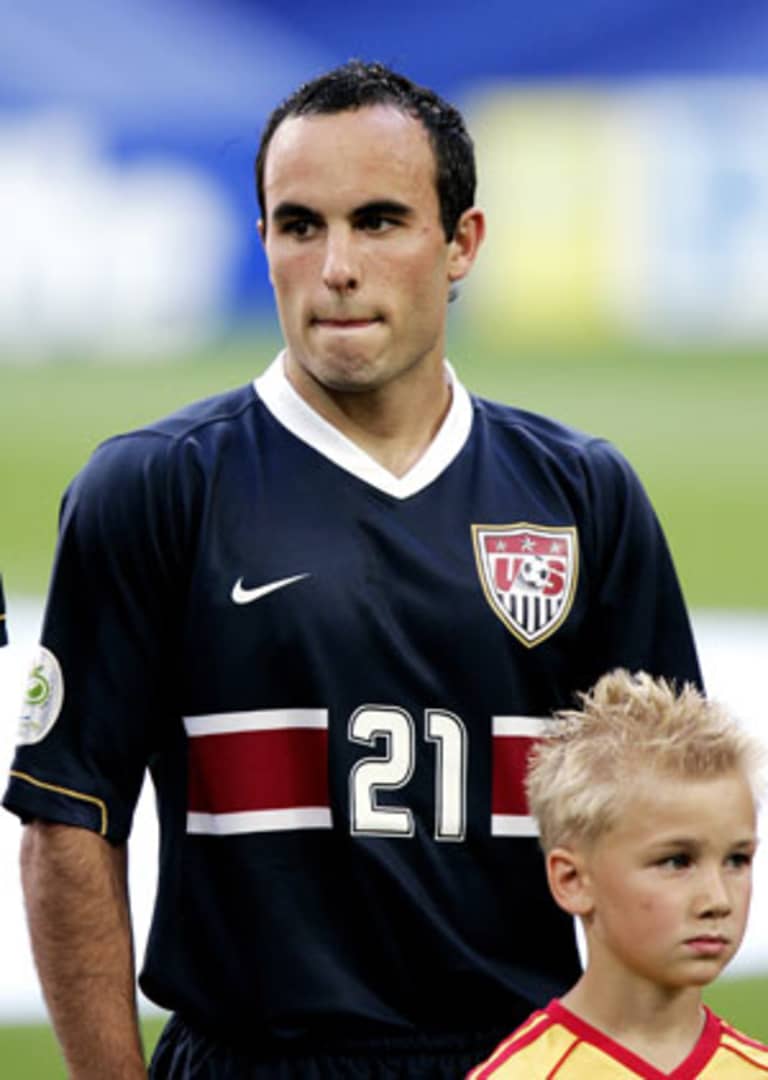
Donovan says that everything up to the 2006 World Cup (above) had been "a fairytale where everything went right." After the team's struggles in Germany, however, he says he went into a depression: "My whole world came crashing down."
(REUTERS)
There are two moments in particular that have given fans a window into the psyche of the most talented and perhaps the most uniquely wired player in American history.
The first was in the aftermath of the Algeria win. In the postgame press conference, Donovan was in tears explaining the emotions he was feeling.
It was a poignant study in contrasts: While the rest of the team was in the locker room hoisting Budweisers with Bill Clinton, Donovan was at the podium, unloading an enormous emotional burden. It felt like less of a media address and more of a confessional.
“I’ve been through a lot in the last four years, and I’m so glad it culminated this way,” he said at the time. “It makes me believe in good in the world, and when you try to do things the right way, it’s good to see them get rewarded.”
As Donovan explains today, that had everything to do with what he perceived as a personal failure at the 2006 World Cup. Just four years after the USMNT’s storybook ride to the quarterfinals in Korea/Japan, the team flamed out in Germany, failing to win a single game.
Donovan took that all on himself, admitting later he felt like he was absent and took the experience for granted. It marked the end of a fable, he says, that was written in his dreams.
“Up until ’06, my career had been this fairytale where everything went right,” he explains, “where everybody loved me. It was great attention. Nothing went wrong.
“And all of a sudden, we have a bad World Cup, I have a bad World Cup and, coming home, I went into this depression for a couple weeks where I was like, my identity was so wrapped up in soccer and then I failed. And so my whole world came crashing down around that.”
The other moment was a little over a year ago when, citing fatigue and a loss of desire, he stepped away from the game after winning his fifth MLS Cup, hinting he might not return at all.
He eventually did, shortly after the 2013 season kicked off – but not after some self-discovery while traveling to Asia and spending time with his family in Southern California. But his explanation was not the sort of thing you hear from an athlete near the top of his game.
“I was just worn out,” he says. “You have to have some balance, and I got to the point where I had no balance in my life. [Soccer] was on my mind all the time constantly, and my family life was suffering, my personal life was suffering, my emotional state was suffering, my body was suffering. I couldn’t do it. I needed a break.”
In 2014, Donovan has an opportunity to do legendary things yet again. He is no longer the captain of the Galaxy – Robbie Keane has worn the armband since his walkabout and continues to do so – but there’s little doubt who the spiritual leader of the club is and off whom it feeds.
“Landon is Landon,” says Galaxy head coach Bruce Arena. “He’s worked real hard to become the player he’s become, so give him the credit.”
*
What’s left for Donovan to prove? He’s played on multiple championship teams, found some success overseas, led the national team to unprecedented heights and achieved at the highest level possible for any American soccer player.
It’s beyond argument that he is the agreed-upon choice as the best American man ever to play the game, and talk of his retirement generally sends fans into fits of mild anxiety.
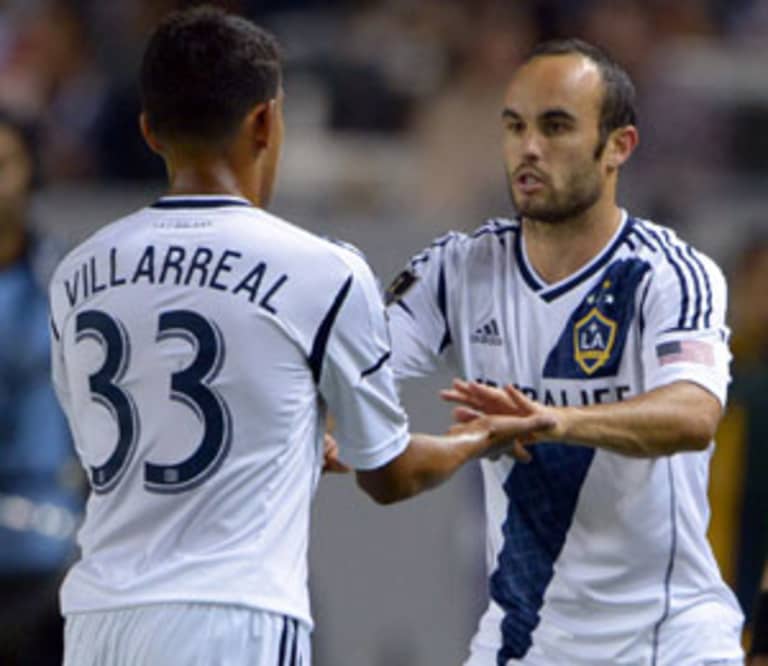
Donovan (in 2013 with former Galaxy Academy star Jose Villarreal)) says one of his goals at this point in his career is to better help younger players: "I can help their mentality a little bit so they’re better prepared.”
(USA Today Sports)
So what’s next? Sure, he wants to help his team continue to succeed. But he’s not driven by the desire to lift more silverware; he’s not particularly concerned about his place in the record books. What he wants is to be remembered for the effect he’s had on his peers.
“I feel like I’m not a great leader yet,” he admits. “And I have moments where I am, but I can be better at that. And that’s sort of what my focus is this year in all ways.”
Donovan says he takes great pride in helping to mentor the kids who are coming through the LA Galaxy Academy – the club currently has seven Homegrown players signed to professional contracts – and takes even bigger pride in the knowledge he can impart upon them to be successful professionals.
Much of that comes from helping them avoid some of the pitfalls to which he fell victim – particularly going straight from US Soccer’s Bradenton Academy to Bayer Leverkusen of the German Bundesliga as a 17-year-old and having enormous difficulty adapting to a rich professional environment thousands of miles from home.
“I think there’s still a big disconnect between the perceptions of what being a professional is and the reality is,” he says. “And I think our young kids now are not taught what it’s like and what it’s going to be like because they’ve had it so easy.
“It was the same when I came in – I was the star of my high school team and my club team and I went to Germany and thought how great I was. And the reality is, nobody cares. Our kids still have some of that and I just think I can help their mentality a little bit so they’re better prepared.”
Beyond that, Donovan does have some concrete goals in 2014, his 14th season in MLS. He wants to be smart and careful with his body – even training less in spots so that he’ll have more in the tank for game days. He wants to think more about what the next step may be for him, whether that’s within or outside the game.
The all-time scoring record actually is important to him. In fact, he could separate himself from Jeff Cunningham as soon as Saturday’s opener vs. Real Salt Lake by scoring career goal No. 135 and getting that landmark achievement out of the way early. But not for the reasons you’d expect.
“It’s really hard to continue to adapt and stay successful in sports, and that’s why you don’t see many guys who stay and do well for long periods of time,” he says. “That’s really difficult. So that’s what I’m most proud of, that I’ve been able to continue to adapt, to continually be a guy that coaches want on the field, that guys love playing with. That’s what matters.
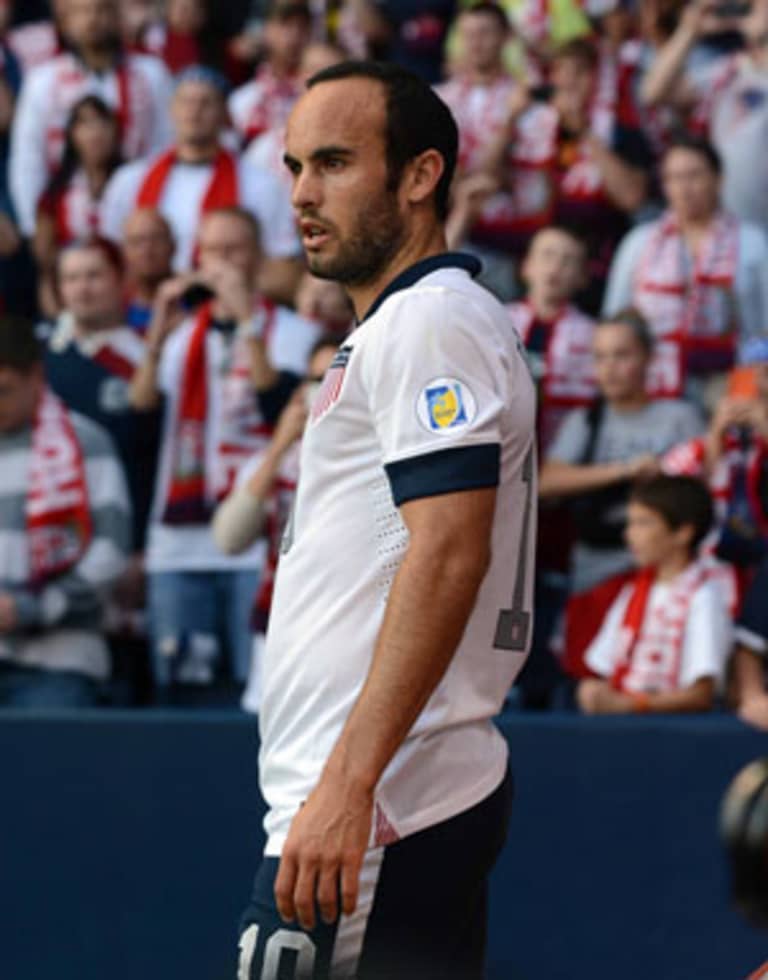
Donovan says he's not thinking much of another "Where Were You?" moment at the World Cup this summer, and that he's prepared to play whatever role is necessary for the US. "“If I go and carry the balls out every day and give guys water, I would happily do that."
(USA Today Sports)
“So when these records come about, I think about being able to do that for so long and taking care of myself the right way so I can be on the field so much. All those things are important because it shows all the work you’ve put in.”
Later this year, there is, of course, the small matter of playing in a fourth World Cup and having an opportunity to grab more of the mainstream’s attention. More than 125,000 Americans will attend matches in Brazil this summer, making them the largest group of traveling fans at the World Cup. TV ratings are expected to eclipse that of 2010, which were already up some 75 percent from ’06.
They all can expect to see that Donovan moment in Pretoria replayed over and over again.
“You have to remember what this tournament can do and moments like that that will arise,” says ESPN analyst Alexi Lalas. “We need to make sure people are reminded of what happened just four years ago and build that anticipation of where the next moment comes from. Who will it be? How will it play out? What will be the implications of it?”
When a single “Where were you?” moment can go viral and take on even more of a life of its own, Donovan is keenly aware that his timely heroics in 2010 may make more people tune in this time around.
“And that’s cool,” he says. “That’s what we need – we need more moments like that, and hopefully one day, eventually winning a World Cup will provide that for people.”
But his days of feeling like it all falls on him are over. And like a king ready to give up the throne, he’s fully at peace with that reality.
“If I go and carry the balls out every day and give guys water and I’m the 23rd man on the roster, I would happily do that,” he says. “I still think I can contribute on the field, but I want to be a part of it and I think I can help in a lot of ways.
“This will be my last chance to do that, and I want to be a part of it.”

